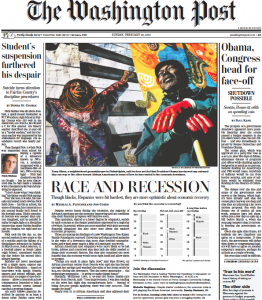 Back in late February, Fox News columnist Juan Williams wrote a scathing piece about racial prejudice in the media. Exhibit A was the Washington Post’s coverage of a poll showing that African Americans and Latinos are optimistic about the economy. The Post, Williams charged, had “buried” this good news because it didn’t fit with the bleak racial stereotypes typically found on the front pages of “the big, white press.”
Back in late February, Fox News columnist Juan Williams wrote a scathing piece about racial prejudice in the media. Exhibit A was the Washington Post’s coverage of a poll showing that African Americans and Latinos are optimistic about the economy. The Post, Williams charged, had “buried” this good news because it didn’t fit with the bleak racial stereotypes typically found on the front pages of “the big, white press.”
Since it turns out that the Post actually had splashed the upbeat poll story all over its Sunday front page and its website, the “entire premise” of Williams’ column, as a reader reported at MediaBugs, was flat-out wrong.
We did what we do in this situation, which is to try to get a response from the media outlet behind the piece in question. Yet, despite multiple attempts on our part to alert Williams and Fox News to the problem, they failed to respond or correct the blunder for weeks.
On Tuesday, Fox finally posted an editor’s note on the piece:
EDITOR’S NOTE: The results of the poll referred to in this article were in fact reported on the front page of the Feb. 20 editions of the Washington Post. Mr. Williams regrets the oversight to the Post, and maintains the study’s findings deserved more prominent coverage in other media outlets.
The good news here is that Williams and Fox finally took responsibility for the mistake. Bravo! We mean it.
Nonetheless, it’s just possible that Williams and Fox might someday make another mistake. And since MediaBugs has published a set of best practices for error reporting and corrections, we thought we would offer a few suggestions should they ever find themselves in this position again:
- Don’t wait a month and a half to fix an error, especially when it’s a flagrant one. If you can’t respond in short order, at least acknowledge inquiries on the matter and let folks know you’re looking into it.
- Try not to mince words. Call an error an “error” and a correction a “correction.” Readers can probably surmise the meaning of “Mr. Williams regrets the oversight to the Post.” But it’s classier not to downplay a mistake while you’re in mid-regret.
- Don’t use a correction to reiterate an argument. Williams certainly is free to wish that other outlets such as the New York Times had covered the Post poll — though, veteran that he is, he must know that most media companies rarely give big play to their competitor’s surveys. But when you’ve reported as fact something that hundreds of thousands of newspaper and online readers know to be false, your mea culpa is not the right place to declare “I was right anyway!” Write another column if you must.
- Give your audience a clear and easy way to alert you when you’ve gone astray. If your “Email Newsroom” link leads the public into a brick wall, and they’ll have to spend weeks chasing down other ways to try getting your attention, you can safely conclude that your status quo is ineffective.
A really good start, in fact, would be to publish any kind of corrections page and policy on your website.
[Cross-posted from the PBS MediaShift blog.]
 Report an error
Report an error